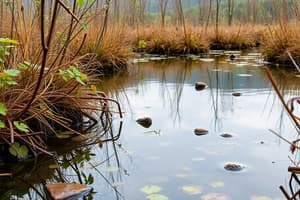Podcast
Questions and Answers
What are the two main components of an ecosystem?
What are the two main components of an ecosystem?
- Temperature and Rainfall
- Abiotic and Biotic (correct)
- Producers and Consumers
- Atmosphere and Earth
What is the primary role of primary producers in an ecosystem?
What is the primary role of primary producers in an ecosystem?
Carry out photosynthesis
Consumers produce their own food. (True/False)
Consumers produce their own food. (True/False)
False (B)
What are organisms called that obtain energy and nutrients from dead organic substances?
What are organisms called that obtain energy and nutrients from dead organic substances?
Ecosystems link biotic and abiotic components through nutrient cycles and ? flows.
Ecosystems link biotic and abiotic components through nutrient cycles and ? flows.
Flashcards are hidden until you start studying
Study Notes
Ecosystem
- An ecosystem is a structural and functional unit of nature or biosphere where living organisms interact with each other and the surrounding physical environment.
- It can be of any size, but usually encompasses specific and limited species, such as an aquatic ecosystem.
Ecosystem vs Environment vs Biosphere
- An ecosystem is a functional unit of the environment, including producers, consumers, decomposers, and their relationships.
- The environment is a group of ecosystems, which can be almost everything or a small region.
- The biosphere is the region on earth that supports life.
Components of an Ecosystem and Environment
Abiotic Components (Non-Living)
- Light: spectral quality of solar radiation is important for life, and the UV component is harmful to many organisms.
- Rainfall: necessary for biochemical reactions and regulating body temperature.
- Temperature: a few organisms are eurythermal (can tolerate a wide range), while most are stenothermal (restricted to a narrow range).
- Atmosphere: 21% oxygen, 78% nitrogen, and 0.038% carbon dioxide are essential for many organisms.
- Organic compounds: proteins, carbohydrates, lipids, etc. are essential for energy transfer.
- Inorganic compounds: carbon, carbon dioxide, water, sulphur, nitrates, phosphates, and ions of various metals are necessary for organisms to survive.
- Altitude: vertical zonation of vegetation is caused by altitude, and change in temperature with altitude is a limiting factor.
- Buffering capacity of the earth: maintains a neutral pH (pH of 7) in soil and water bodies, conducive for living organisms.
- Salinity: some organisms are euryhaline (tolerant of a wide range), while others are stenohaline (restricted to a narrow range).
Biotic Components (Living)
- Primary producers (autotrophs): green plants, certain bacteria, and algae that carry out photosynthesis.
- Consumers (heterotrophs or phagotrophs): incapable of producing their own food, depending on organic food from plants, animals, or both.
- Macro consumers:
- Herbivores (primary consumers): feed mainly on plants.
- Secondary consumers: feed on primary consumers.
- Tertiary consumers: feed on both primary and secondary consumers.
- Omnivores: consume both plants and animals.
- Micro consumers (saprotrophs or decomposers): bacteria and fungi that obtain energy and nutrients from dead organic substances (detritus).
- Detritivores: earthworms and certain soil organisms that help in the decomposition of organic matter.
Studying That Suits You
Use AI to generate personalized quizzes and flashcards to suit your learning preferences.





